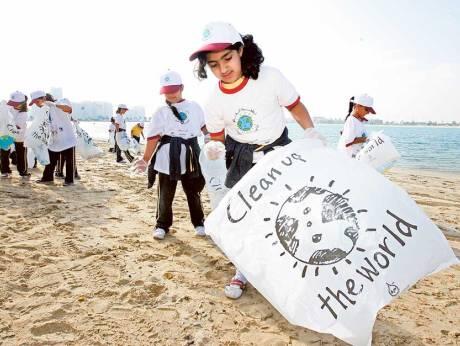The UAE’s historic formal joining of the Paris Agreement on September 21 — a first in the Gulf region — is a step in the right direction, says a top climate change expert in the emirates.
But, a long journey lies ahead to reduce the UAE carbon footprint in order to stave off global warming both in the country and abroad, says Tanzeed Alam, Climate and Energy Director, Emirates Wildlife Society-WWF.
Alam lauded the UAE for marshalling the political will to help fight global warming, as one of 175 countries who signed the accord in April.
“It was a good start but it has a lot more room for improvement,” Alam told Gulf News in an interview, suggesting that the UAE should adopt more ambitious domestic greenhouse gas reduction targets to be included in a forthcoming national strategy to fight carbon emissions.
Alam said a critical element to slashing emissions is a strong UAE National Climate Change Plan that focuses on renewable energy projects such as solar to generate clean electricity as well as energy-efficient buildings and electric or hybrid vehicles to slash fossil-fuel emissions.
The Ministry of Climate Change and Environment started development of its UAE National Climate Change Plan in June to frame decarbonising efforts well into the century ahead.
In its submission to the Paris Agreement, the UAE has committed in writing “to pursue a portfolio of actions including an increase of clean energy to 24 per cent of total energy mix by 2021.”
A large portion of that green energy generation will come from Western Region’s Barakah nuclear power plant where the first of four reactor units now under construction is expected to go online next year.
All four nuclear reactors are set for completion by 2020 to provide up to a quarter of the country’s electricity demands yearly.
Alam said that in order to reach higher reductions of greenhouse gases, the UAE “needs more renewables to decarbonise the energy sector”.
He praised Dubai for its array of carbon projects for a green economy but said the effort to reduce emissions need to be embraced nationally by all players in the UAE.
“Dubai is leading the UAE but there are six other emirates,” Alam said. “We would like to see generation targets to ensure solar projects are generating and not just built as nice projects. They have to be operating and providing clean energy for the grid, that’s what will reduce emissions in the UAE.”
The UAE’s environment ministry said as part of its Paris Agreement submission that its new UAE National Climate Change Plan “is being designed in consultation with government, business stakeholders, academia and civil society organisations and will prove that climate action can go hand in hand with increased economic growth and development.”
“The UAE is playing its part to tackle climate change, with effective policies and initiatives that aim to diversify the economy into new, knowledge-based industries. It has led the region in deploying clean energy, with pioneering projects and policies in renewable and nuclear energy, energy and water efficiency, and carbon sequestration an was the first in the region to set a clean energy target, of 24 per cent by 2021.”
Challenge of scale
Tanzeed Alam, Climate and Energy Director, Emirates Wildlife Society-WWF, said the climate-change challenges for the UAE are many given that the country is growing, placing demands on electricity authorities.
In a EWS-WWF report on energy and water efficiency in the UAE that he recently co-authored, Alam said the country has “seen considerable economic development, which has led to significant growth of GHG emissions of an average of 5 per cent per year from 1994 to 2013”.
“In 2014, the energy sector accounted for 80 per cent of all GHGs, with 35 per cent directly coming from the power sector [MoENR, 2016], notably for electricity and water production. Energy demand is expected to nearly double by 2030 and water use to increase 44 per cent by 2025 [UNEP, 2013],” the report stated.
Source: Gulf News











